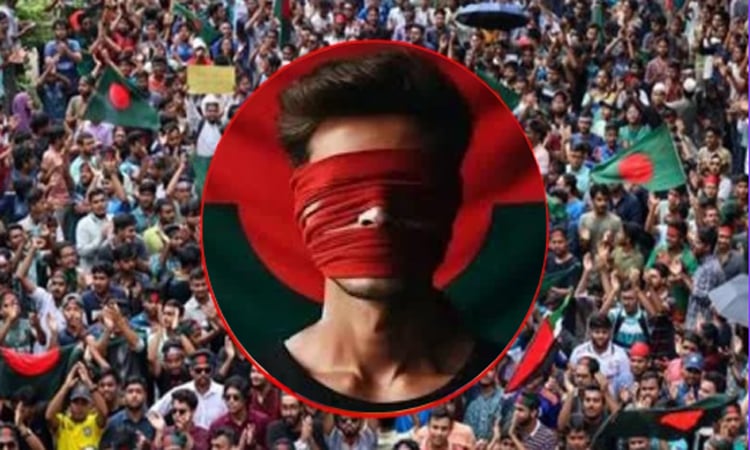News Flash

DHAKA, July 28, 2025 (BSS) - The student protesters on July 29 last year declared protest programmes ‘tying red cloth on mouth and eye' across the country for July 30, rejecting the government's decision to observe a national mourning day wearing 'black badge' to commemorate the people killed during the quota reform movement.
In the afternoon, on July 29, the government declared a national mourning day to be observed on July 30, urging the people across the country to observe the day by "wearing black badges" and offer special prayers at all mosques, temples, churches, pagodas and all other religious places seeking divine blessings for the souls of the people killed during the quota reform movement.
But in a reaction, the anti-discrimination student movement leaders rejected the government-declared mourning and announced to hold demonstrations across the country 'tying red cloth on mouth and eye' across the country on the same day.
Mahin Sarkar, a coordinator of the movement, declared the programme around 9:30pm that day by sending SMS to journalists.
Through the SMS, he said without ensuring justice for killings and torture, announcing mourning was nothing but mockery with the students and general people.
In the message Mahin reiterated their nine-point demands and urged all to stage demonstrations across the country 'tying red cloth on mouth and eye' on July 30 and upload photos on social media.
Soon after the announcement, the people from all strata across the country responded to the call and immediately started making their social media profile pictures 'red'.
Apart from students and general people, many celebrities also joined in, changing their Facebook profile photos to express solidarity with the student protesters.
Earlier, on the day, protesting students staged demonstrations and sit-ins in different parts of the country demanding an end to abductions and arrests, release of detainees, withdrawal of false cases, and justice for those killed during the protests.
They also strongly condemned, saying that the six central coordinators of the quota reform movement, who were in Detective Branch (DB) custody, were forced to make the announcement of withdrawing movement from the DB office.
Despite heavy deployment of law enforcers, demonstrations were held in Dhaka, Jahangirnagar University, Shahjalal University of Science and Technology in Sylhet, Chattogram, Rajshahi, Cumilla, Barishal, Thakurgaon, Bogura, Jashore, and Noakhali. Several protestors were detained from the demonstration sites on the day as the law enforcers were continuing mass arrest across the country.
In Dhaka, protestors gathered in areas including Paltan, Segunbagicha, Science Lab, ECB Square and Mirpur-10 while police charged batons and dispersed the crowds. At least 50 students were reportedly detained from gathering spots in the capital alone.
However, amid the nationwide curfew that continued for the tenth consecutive day with a relaxation for a long time on July 29, government offices and most public services operated normally in the capital while traffic movement across the city was largely also normal.
From early morning, a large number of law enforcement personnel were deployed in key areas of the capital. Helicopters of the Rapid Action Battalion (RAB) patrolled the skies, and army units were seen patrolling across the streets.
Checkpoints were set up at different locations while police used loudspeakers to warn against public gatherings. Alongside the security forces, ruling Awami League activists were also seen occupying the streets.
Meanwhile, the High Court expressed anger at the publishing of the photo of six detained protest coordinators having food at the DB office, labeling it as a national-level mockery.
The High Court bench expressed the anger during a hearing on a writ petition seeking immediate release of the coordinators and a ban on firing at student protestors.
Besides, that night, 14-party alliance leaders at a meeting with the deposed Prime Minister Sheikh Hasina in the chair at the Ganabhaban unanimously agreed on banning the politics of Jamaat-e-Islami and its student wing, Islami Chhatra Shibir.
Following the meeting, Awami League General Secretary Obaidul Quader stated that the 14-party leaders believed that BNP, Jamaat, Chhatra Dal and Shibir, along with their extremist allies, were conspiring to undermine Bangladesh's independence and sovereignty.
Therefore, the alliance fully supported banning Jamaat and Shibir from politics.
Besides, a National People's Inquiry Commission was formed to investigate into the killings, shootings, arrests and torture during the quota reform movement.
The commission was made following a human chain formed by lawyers in front of the Supreme Court under the banner "We Demand Justice for Mass Killings; End Enforced Disappearances, Arrests and Torture."
On the same day, BNP Secretary General Mirza Fakhrul Islam Alamgir rejected the government's official death toll, saying it was unreliable. He cited media reports that showed significantly higher numbers of casualties.
The 'Ganatantra Manch', however, placed a six-point demand including an independent investigation into the killings of students during the movement under the supervision of the United Nations (UN).
Their six-points also included immediate withdrawal of the curfew, withdrawal of law enforcers including BGB and special units from the streets, full restoration of internet services, trial of those who ordered or carried out shootings, release of all arrested opposition activists and students, withdrawal of false charges, release of those abducted by intelligence agencies, reopening of all educational institutions and stop 'block raids' to arrest people.
Besides, teachers from across the country dubbed the student killings in July as the "July Massacre." Over a hundred of teachers from public and private universities demanded an end to enforced disappearances, arbitrary arrests and intimidation of students and called for the release of detainees.
Transparency International Bangladesh (TIB) condemned the incident of forcing the detained coordinators at the DB office to issue a statement. The TIB said it was "unethical" and a "heinous crime."
The organization said that the DB misled the people about the detention of the coordinators and there was no legal basis for such "protective custody."
Besides, a group of 74 eminent citizens also issued a statement demanding an investigation into each incident under the UN-supervision.